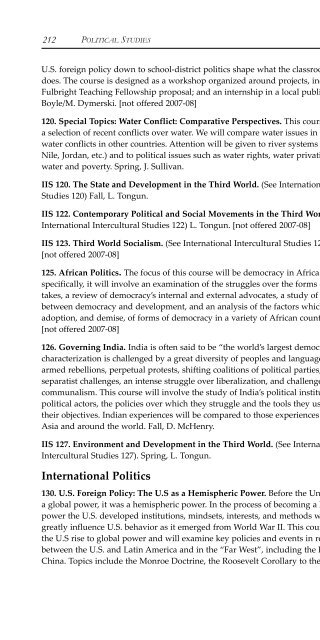Create successful ePaper yourself
Turn your PDF publications into a flip-book with our unique Google optimized e-Paper software.
212 POLITICAL STUDIES<br />
POLITICAL STUDIES<br />
U.S. foreign policy down to school-district politics shape what the classroom teacher<br />
does. The course is designed as a workshop organized around projects, including<br />
Fulbright Teaching Fellowship proposal; and an internship in a local public school. N.<br />
Boyle/M. Dymerski. [not offered <strong>2007</strong>-<strong>08</strong>]<br />
120. Special Topics: Water Conflict: Comparative Perspectives. This course will examine<br />
a selection of recent conflicts over water. We will compare water issues in California with<br />
water conflicts in other countries. Attention will be given to river systems (Colorado,<br />
Nile, Jordan, etc.) and to political issues such as water rights, water privatization, and<br />
water and poverty. Spring, J. Sullivan.<br />
IIS 120. The State and Development in the Third World. (See International Intercultural<br />
Studies 120) Fall, L. Tongun.<br />
IIS 122. Contemporary Political and Social Movements in the Third World. (See<br />
International Intercultural Studies 122) L. Tongun. [not offered <strong>2007</strong>-<strong>08</strong>]<br />
IIS 123. Third World Socialism. (See International Intercultural Studies 123). L. Tongun.<br />
[not offered <strong>2007</strong>-<strong>08</strong>]<br />
125. African Politics. The focus of this course will be democracy in Africa. More<br />
specifically, it will involve an examination of the struggles over the forms democracy<br />
takes, a review of democracy’s internal and external advocates, a study of the relationship<br />
between democracy and development, and an analysis of the factors which led to the<br />
adoption, and demise, of forms of democracy in a variety of African countries. L. Tongun.<br />
[not offered <strong>2007</strong>-<strong>08</strong>]<br />
126. Governing India. India is often said to be “the world’s largest democracy.” Yet, this<br />
characterization is challenged by a great diversity of peoples and languages, on-going<br />
armed rebellions, perpetual protests, shifting coalitions of political parties, regional<br />
separatist challenges, an intense struggle over liberalization, and challenges of<br />
communalism. This course will involve the study of India’s political institutions, its<br />
political actors, the policies over which they struggle and the tools they use to realize<br />
their objectives. Indian experiences will be compared to those experiences elsewhere in<br />
Asia and around the world. Fall, D. McHenry.<br />
IIS 127. Environment and Development in the Third World. (See International<br />
Intercultural Studies 127). Spring, L. Tongun.<br />
International Politics<br />
130. U.S. Foreign Policy: The U.S as a Hemispheric Power. Before the United States was<br />
a global power, it was a hemispheric power. In the process of becoming a hemispheric<br />
power the U.S. developed institutions, mindsets, interests, and methods which would<br />
greatly influence U.S. behavior as it emerged from World War II. This course focuses on<br />
the U.S rise to global power and will examine key policies and events in relations<br />
between the U.S. and Latin America and in the “Far West”, including the Philippines and<br />
China. Topics include the Monroe Doctrine, the Roosevelt Corollary to the Monroe<br />
Doctrine, The Open Door policy, Dollar Diplomacy, the Good Neighborhood, and the<br />
various military operations enforcing those policies. Fall, D. Ward.<br />
213<br />
131. U.S. Foreign Policy: The U.S. as a Global Power. This course focuses on U.S. foreign<br />
policy since World War II. This course will employ various decision making models such<br />
as the rational actor, bureaucratic politics, governmental politics, groupthink, and<br />
imperialistic models to examine various cases including U.S. relations with Vietnam, Iran,<br />
Guatemala, Cuba, Chile, El Salvador, Nicaragua, Angola, Panama, Grenada, Afghanistan,<br />
and Iraq. In the process of exploring these cases we will trace the evolution of U.S. policy<br />
from Containment to Preventive War. Spring, D. Ward.<br />
133. Film, Politics and the Cold War. For nearly 50 years the Cold War influenced nearly<br />
all aspects of American political and culture life. This course examine Cold War genre<br />
films in an effort to understand how Americans perceived the Soviet threat and how<br />
these popular perceptions influenced international and domestic politics. Spring, A. Pantoja.<br />
134CH. U.S. Foreign Policy and Mexico. This course will present an overview of<br />
contemporary U.S. foreign policy towards Mexico. The historical antecedents and the<br />
contemporary forces affecting U.S.-Mexico foreign policy will be examined. Policy issues<br />
such as immigration, the North American Free Trade Association, and U.S. Mexican<br />
relations with the context of U.S. Latin American policy will be explored.<br />
[not offered <strong>2007</strong>-<strong>08</strong>]<br />
141. International Political Economy. Examines the relationship between the<br />
contemporary global economy and the nation-state through Liberal, Marxist, and Realist<br />
paradigms. Treats the evolution of the international trading and monetary systems over<br />
the past two centuries, the relations between rich and poor countries, the roles of global<br />
banks and corporations, and the transitions to market economies in Eastern Europe,<br />
Russia, and China. Background in international politics and/or international economics is<br />
desirable. Fall, T. Ilgen.<br />
142. The Third World and the Global Economy. An examination of the impact of<br />
international economic systems on the wealth and welfare of Third World countries.<br />
Early weeks treat theories of imperialism and the legacy of colonialism prior to World<br />
War II. Attention is then directed to problems raised by the contemporary global<br />
economic order: trade, aid and finance, debt, technology transfer, and the multinational firm.<br />
Spring, T. Ilgen.<br />
143. Global Governance. This course explores efforts to address global issues with<br />
institutions and organizations that transcend the nation-state. The United Nations,<br />
regional arrangements such as the EU and NAFTA, and the role of non-governmental<br />
organizations (NGOs) will be examined. Fall, T. Ilgen.<br />
IIS 146. International Relations of the Middle East. (See International Intercultural<br />
Studies 146). Spring, L. Tongun.






![Anticipated Courses SP14 [pdf] - Pomona College](https://img.yumpu.com/25363335/1/190x245/anticipated-courses-sp14-pdf-pomona-college.jpg?quality=85)










